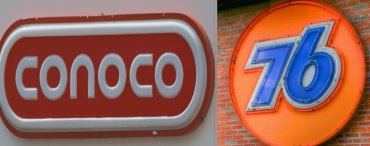Phillips 66 Lubricants announced it will eliminate two of its four lubricant brands – Conoco and 76 Lubricants – and continue marketing oils under its Phillips 66 and Kendall labels.
The U.S. fuel and lubricants supplier said it is taking the action, effective July 1, in order to ease confusion among its customers. The company has marketed lubricants under four brands since 2002, when Phillips 66 and Conoco merged to form ConocoPhillips. Before the merger, Phillips used the Phillips 66, 76 Lubricants and Kendall brands. ConocoPhillips spun off its downstream business as Phillips 66 in 2012.

Photos: Phillips 66
Phillips 66 will cease using its 76 Lubricants and Conoco brands for lube sales on July 1.
The consolidation will eliminate two lubricant brands with long histories and once strong regional presences. Conoco was founded in Utah in 1875 as the Continental Oil and Transport Co. and later developed a strong following for Conoco lubricants in Oklahoma and surrounding parts of the Southwest. It specialized in lubricants for mining, natural gas engines, power generation, construction and commercial trucking.
The 76 Lubricants label was established in 1890 by Californias Union Oil Co. and became a popular brand in Western states for passenger car and heavy-duty engine oils along with lubricants for heavy construction equipment and stressful industrial applications. 76 Lubricants was acquired by Phillips 66 as part of its purchase of Tosco Corp. in September 2001.
We historically included three brands – Phillips 66, Conoco and 76 – on a tri-branded packaging label for certain categories of products in the marketplace, such as industrial lubricants, greases, automatic transmission fluids and some heavy-duty engine oils, Jamie Allison, director of brand management for Phillips 66, told Lube Report.
Transitioning away from a tri-branded strategy provides a clearer brand promise and stronger product positioning, and the benefit will be greater overall brand recognition, which will ultimately streamline selling efforts, said Allison.
Phillips 66 customers have already been notified of the consolidation of brands. Following the transition, the company will introduce a line of premium automotive lubricants under the Phillips 66 brand, joining existing heavy-duty engine oils, natural gas engine oils, aviation and industrial products.
The consolidation will reduce Phillips 66s management of the different lubricant brands that it markets to different segments, said George Morvey, industry manager for Parsippany, N.J.-based consultancy Kline & Co.s Energy Practice.
Another issue challenging the major branded lubricant suppliers like Phillips 66 is the expansion of private label brands and OEM-genuine oil brands, Morvey told Lube Report. In the franchised workshop segment, for example, OEM-genuine oil brands control this space, making it extremely difficult for all suppliers to sell service fill lubricants under their own brand name.
This effort will also make the supply chain of Phillips 66 more efficient, said Morvey, since the Phillips 66 brand will cover the commercial, industrial and consumer segments after the launch of the new automotive line.
There will certainly be some effort required to communicate the consolidation and its benefits to Phillips 66s marketer partners and largest customers, but from a technical aspect, end users will not have to compromise on product quality or service levels, he assured.
To Kline, the move by Phillips 66 will be beneficial in the long run. Having a two-brand product portfolio will yield some efficiencies and savings for Phillips 66 in its North America base and also allow it to expand its business in the Middle East and Asia-Pacific, especially given the premium and attention a Made in USA brand enjoys in these regions, Morvey said.